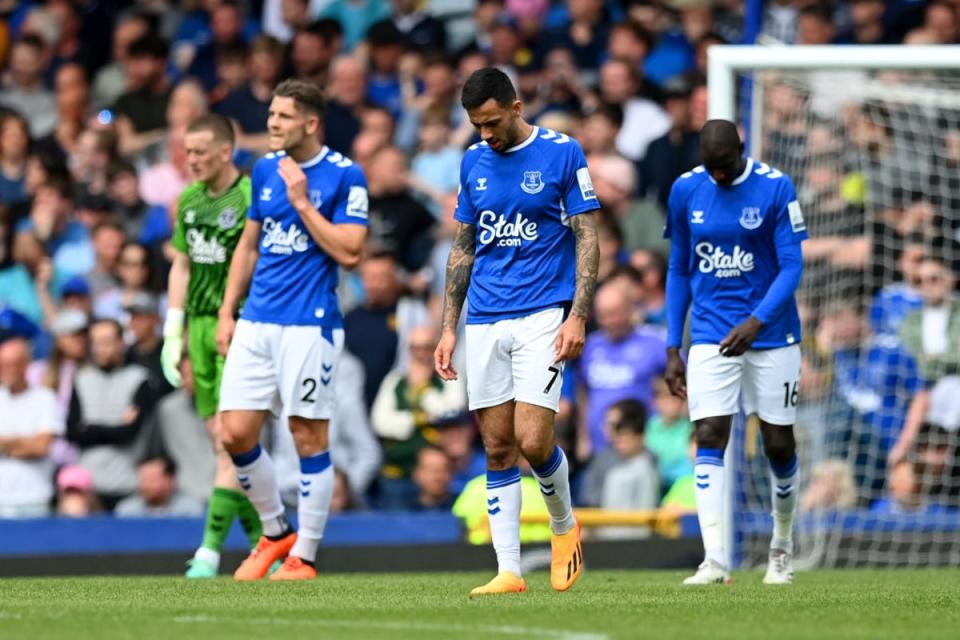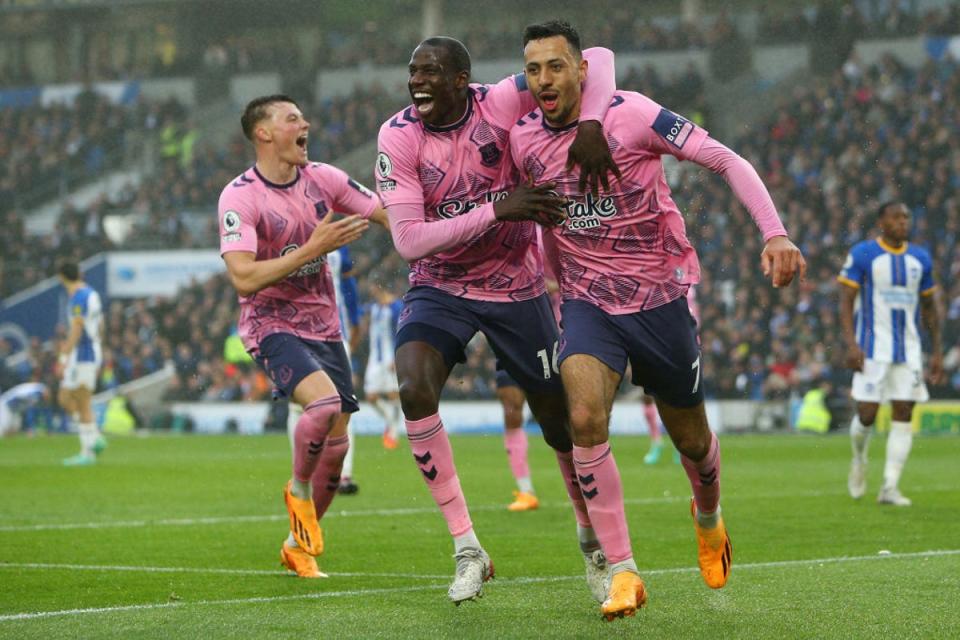Everton stare into the relegation abyss – a mess of their own making

If the first 11 have presented a problem, the greater warning came on page 11. Page 11, that is, of Everton’s annual financial report. “Conditions indicate the existence of a material uncertainty that may cast significant doubt about the group’s ability to continue as a going concern,” it read. Those conditions, in the curious way Everton phrased it, were “if the assumptions in the relegation scenario were not achieved”.
Their assumptions were that a storied club, founder members of the Football League and the club who have played more top-division games than any other in England, would stay up. With one game to go, they are one place above the relegation zone, their fate in their hands but dicing with disaster. A win against Bournemouth will keep Everton up. Anything else would doom them if Leicester win; lose and Leeds would leapfrog Everton with a victory of their own.
Clubs in such positions are often imperilled; but not with an existential threat. As it is, Everton’s majority shareholder, Farhad Moshiri, has provided assurances of his intention to fund the club if they go down. But, as was noted in the annual report, they are not legally binding. There is a separate question of whether Moshiri could afford to: certainly both his and Everton’s finances appear slighter since his long-time business partner Alisher Usmanov was sanctioned by the British government amid Russia’s invasion of Ukraine.
The Uzbek-Russian billionaire’s company, USM, had sponsored Everton’s Finch Farm training ground; he had paid for the first option to the naming rights of their new stadium at Bramley-Moore Dock. And Everton have needed money: even with Premier League revenues, they lost £44m in the last financial year; although that was dramatically better than losing £371m in the previous three years, albeit partly due to Covid. They face a Premier League investigation into alleged Financial Fair Play breaches, though they are adamant all recent deals have been run past the league to ensure they are compliant.
But Everton may be staring into the abyss. Manager Sean Dyche said recently that livelihoods were on the line. So is much more. Everton have enjoyed 120 years of top-flight football, the last 69 of them unbroken. But Goodison Park, where Pele and Eusebio scored in the 1966 World Cup, could host its last Premier League game against Bournemouth on Sunday. Everton are due to move to Bramley-Moore Dock in 2024; finishing that requires money and they are in an exclusivity period for negotiations with the American firm MSP Sports Capital to invest in the club. An announcement could be forthcoming in the next weeks if Everton stay up; go down, however, and the context changes dramatically.
Such funding, or indeed such a reliance on last-day results, may not be required had Everton not spent so much so badly in the Moshiri years. Their outlay on signings has topped £600m and yet the team was in such a state of disrepair that, for much of last week’s match against Wolves, their team, with the exception of Jordan Pickford, consisted solely of centre-backs, central midfielders and wingers. It was not an innovative tactical ploy. They did not have a fit full-back or, after Dominic Calvert-Lewin went off with his latest injury, a striker trusted to take the field.
Which highlights one of the fundamental flaws in Everton’s thinking. Last season, Calvert-Lewin scored the goal that kept them up, but only after Richarlison had struck five others in the run-in. Richarlison had to be sold to bring in £60m before 30 June, the end of the Premier League’s financial year. Since then, Everton have banked on the fitness of an unfit player, who may now miss what could be billed as one of the biggest games in their long history. Meanwhile, Neal Maupay, the summer striking signing, is on a run of 27 games without a goal; he may count as former manager Frank Lampard’s greatest error, although that is a competitive list.

Yet Everton have been prisoners of their past. Their summer deals tended to be for players with low up-front fees, signing those who they could get rather than, in some cases, who they ideally wanted. It means they still owe much of the cost of Dwight McNeil and Amadou Onana, who should at least command sizeable fees if they have to be sold, and Maupay, who may join the list of Everton buys who are unsellable. If other clubs can at least compensate for relegation by selling Premier League performers, Everton have fewer who would bring in large amounts – Calvert-Lewin could be a £50m forward if fit, but not otherwise, so that may only leave Pickford, McNeil and Onana – and still owe plenty.
Relegation could be attributed to their past financial mismanagement. They were unable to buy in January until Anthony Gordon was sold, seeing targets such as Danny Ings go elsewhere (somewhat farcically, Arnaut Danjuma, who could have been a high-class loanee, got off a train at Crewe when he learned of Tottenham’s interest, switched platforms and hopped on one back down to London). They botched the end of the window and, if they were keen not to repeat past mistakes by overpaying for undistinguished players, the eventual verdict may be that the lack of another forward cost them their Premier League status; they enter the last game of the campaign with a mere four goals from specialist strikers all season.
They face Bournemouth, who beat them twice in a week before the World Cup, scoring seven goals. Hindsight suggests Lampard perhaps should have been dismissed then, but he engineered a memorable escape from relegation last season. Perhaps, though, he just delayed it by a year. And if so, Moshiri’s seven years of clueless transfer-market excess might render it the most expensive relegation of all. And, considering the potential consequences to the club, among the most damaging.

 Yahoo Sport
Yahoo Sport 





































